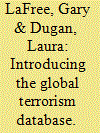| Srl | Item |
| 1 |
ID:
077131


|
|
|
|
|
| Publication |
2007.
|
| Summary/Abstract |
Compared to most types of criminal violence, terrorism poses special data collection challenges. In response, there has been growing interest in open source terrorist event data bases. One of the major problems with these data bases in the past is that they have been limited to international events - those involving a national or group of nationals from one country attacking targets physically located in another country. Past research shows that domestic incidents greatly outnumber international incidents. In this paper we describe a previously unavailable open source data base that includes some 70,000 domestic and international incidents since 1970. We began the Global Terrorism Database (GTD) by computerizing data originally collected by the Pinkerton Global Intelligence Service (PGIS). Following computerization, our research team has been working for the past two years to validate and extend the data to real time. In this paper, we describe our data collection efforts, the strengths and weaknesses of open source data in general and the GTD in particular, and provide descriptive statistics on the contents of this new resource
|
|
|
|
|
|
|
|
|
|
|
|
|
|
|
|
| 2 |
ID:
089989


|
|
|
|
|
| Publication |
2009.
|
| Summary/Abstract |
This study presents American state police agencies' perceptions about three significant terrorism and public safety issues. First, we asked about the threat posed by specified extremist groups nationally and to their state. We asked about the number of such groups and their supporters, and the number of activities each group participates in during a typical year in their state. We also asked about the number of criminal incidents each group commits and the number of their supporters arrested in a typical year. Second, we asked the agencies to rate the usefulness of fifteen specified terrorism sources. Third, we queried the agencies about their views of eight terrorism definitions. These data were collected by surveying the fifty state police agencies in the United States. We discovered widespread concern about the criminal activities of various extremist groups, with a particular concern about the threat of Islamic jihadists. Interestingly, although the top rated threat was Islamic jihadists, the respondents indicated that other types of groups were much more criminally active. Further, respondents indicated that various open and non-open sources were valuable terrorism sources. Finally, most respondents reacted more favorably to official terrorism definitions-especially the FBI's-as opposed to academic definitions. We conclude with a discussion of the policy implications of our findings and we outline directions for future research.
|
|
|
|
|
|
|
|
|
|
|
|
|
|
|
|